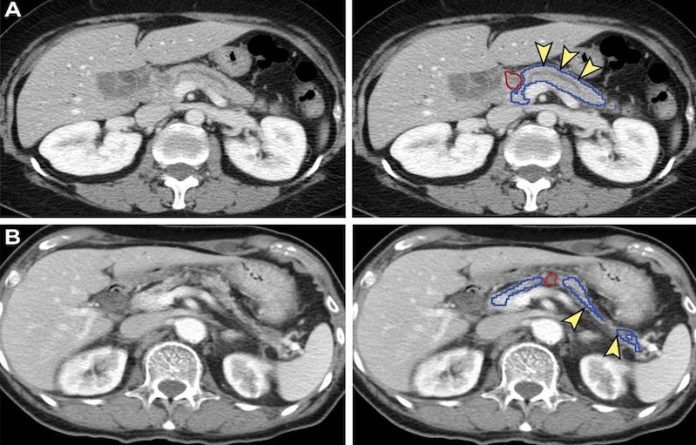
Pancreatic cancer has the lowest five-year survival rate among cancers.
It is projected to become the second leading cause of cancer death in the United States by 2030.
Early detection is the best way to improve the dismal outlook, as the prognosis worsens significantly once the tumor grows beyond 2 centimeters.
In a study from National Taiwan University, scientists found an artificial intelligence (AI) tool is highly effective at detecting pancreatic cancer on CT.
CT is the key imaging method for the detection of pancreatic cancer, but it misses about 40% of tumors under 2 centimeters. There is an urgent need for an effective tool to help radiologists in improving pancreatic cancer detection.
Researchers have been studying a computer-aided detection (CAD) tool that uses a type of AI called deep learning to detect pancreatic cancer.
In the new study, the researchers developed the tool with an internal test set consisting of 546 patients with pancreatic cancer and 733 control participants.
The tool achieved 90% sensitivity and 96% specificity in the internal test set.
The AI tool identified the pancreas automatically. This is an important advance considering that the pancreas borders multiple organs and structures and varies widely in shape and size.
Validation was followed with a set of 1,473 individual CT exams from institutions throughout Taiwan.
The tool achieved 90% sensitivity and 93% specificity in distinguishing pancreatic cancer from controls in that set. The sensitivity for detecting pancreatic cancers less than 2 centimeters was 75%.
The team says The CAD tool has the potential to provide a wealth of information to assist clinicians, it could indicate the region of suspicion to speed radiologist interpretation.
The researchers are planning further studies. In particular, they want to look at the tool’s performance in more diverse populations.
Since the current study was retrospective, they want to see how it performs going forward in real-world clinical settings.
If you care about cancer, please read studies about the cause of common pancreatic cancer, and artificial sweeteners are linked to higher cancer risk.
For more information about health, please see recent studies about how drinking milk affects the risks of heart disease and cancer, and results showing vitamin D supplements strongly reduces cancer death.
The study was conducted by Weichung Wang et al and published in Radiology.
Copyright © 2022 Knowridge Science Report. All rights reserved.



